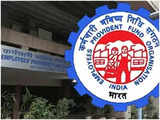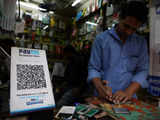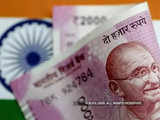Suggest a new Definition
Proposed definitions will be considered for inclusion in the Economictimes.com
What is 'E-wallets'
Definition: E-wallet is a type of electronic card which is used for transactions made online through a computer or a smartphone. Its utility is same as a credit or debit card. An E-wallet needs to be linked with the individual’s bank account to make payments.
Descriptions: E-wallet is a type of pre-paid account in which a user can store his/her money for any future online transaction. An E-wallet is protected with a password. With the help of an E-wallet, one can make payments for groceries, online purchases, and flight tickets, among others.
E-wallet has mainly two components, software and information. The software component stores personal information and provides security and encryption of the data. The information component is a database of details provided by the user which includes their name, shipping address, payment method, amount to be paid, credit or debit card details, etc.
For setting up an E-wallet account, the user needs to install the software on his/her device, and enter the relevant information required. After shopping online, the E-wallet automatically fills in the user’s information on the payment form. To activate the E-wallet, the user needs to enter his password. Once the online payment is made, the consumer is not required to fill the order form on any other website as the information gets stored in the database and is updated automatically.
Descriptions: E-wallet is a type of pre-paid account in which a user can store his/her money for any future online transaction. An E-wallet is protected with a password. With the help of an E-wallet, one can make payments for groceries, online purchases, and flight tickets, among others.
E-wallet has mainly two components, software and information. The software component stores personal information and provides security and encryption of the data. The information component is a database of details provided by the user which includes their name, shipping address, payment method, amount to be paid, credit or debit card details, etc.
For setting up an E-wallet account, the user needs to install the software on his/her device, and enter the relevant information required. After shopping online, the E-wallet automatically fills in the user’s information on the payment form. To activate the E-wallet, the user needs to enter his password. Once the online payment is made, the consumer is not required to fill the order form on any other website as the information gets stored in the database and is updated automatically.
Related News
 EPFO, ESIC subscribers may soon use claim amounts via e-wallets: Labour secyThe Employees' Provident Fund Organisation (EPFO) and Employees' State Insurance Corporation are exploring options for subscribers to access claim settlements through e-wallets. The Labour Ministry is in discussions with banks and the Reserve Bank of India to develop a practical mechanism for direct transfer of funds, potentially bypassing traditional bank accounts.
EPFO, ESIC subscribers may soon use claim amounts via e-wallets: Labour secyThe Employees' Provident Fund Organisation (EPFO) and Employees' State Insurance Corporation are exploring options for subscribers to access claim settlements through e-wallets. The Labour Ministry is in discussions with banks and the Reserve Bank of India to develop a practical mechanism for direct transfer of funds, potentially bypassing traditional bank accounts. View: It’s time for a single QR code for all the world’s paymentsThe major economies of the Association of Southeast Asian Nations — Indonesia, Malaysia, Singapore, Thailand, Vietnam and the Philippines — are linking their QRs for the 18 million intra-regional tourists who spend around $19 billion annually. Assuming that it is able to capture 15% to 20% of transactions, ASEAN QR would facilitate $4 billion in consumer expenditure and inspire the rest of the world, according to the Boston Consulting Group.
View: It’s time for a single QR code for all the world’s paymentsThe major economies of the Association of Southeast Asian Nations — Indonesia, Malaysia, Singapore, Thailand, Vietnam and the Philippines — are linking their QRs for the 18 million intra-regional tourists who spend around $19 billion annually. Assuming that it is able to capture 15% to 20% of transactions, ASEAN QR would facilitate $4 billion in consumer expenditure and inspire the rest of the world, according to the Boston Consulting Group. E-wallets for investing in mutual funds should be KYC norms compliant: SebiThe Securities and Exchange Board of India, in its circular dated May 8, 2017, allowed the use of e-wallets for investment in mutual funds within the umbrella limit of Rs 50,000 for investments by investors, especially the young generation -- to purchase these instruments through both e-wallet and/or cash per mutual fund per financial year.
E-wallets for investing in mutual funds should be KYC norms compliant: SebiThe Securities and Exchange Board of India, in its circular dated May 8, 2017, allowed the use of e-wallets for investment in mutual funds within the umbrella limit of Rs 50,000 for investments by investors, especially the young generation -- to purchase these instruments through both e-wallet and/or cash per mutual fund per financial year. MFIs to play leading role in India's economic growth: StudyAccording to PwC, the global market size of the MFI industry is expected to grow by USD122.46 billion from 2021 to 2026 at a compound annual growth rate of 11.61 per cent. Moreover, global development agencies and several governments have made concerted efforts to alleviate poverty through micro-credits, it said.
MFIs to play leading role in India's economic growth: StudyAccording to PwC, the global market size of the MFI industry is expected to grow by USD122.46 billion from 2021 to 2026 at a compound annual growth rate of 11.61 per cent. Moreover, global development agencies and several governments have made concerted efforts to alleviate poverty through micro-credits, it said. India witnessing increasing digitisation, shift in consumers' financial behaviour: NITI VC"India is witnessing increasing digitization with people getting greater and easier access to financial services. This has led to a shift in consumers' financial behaviour -- from cash to e-wallets and UPI," Rajiv Kumar said.
India witnessing increasing digitisation, shift in consumers' financial behaviour: NITI VC"India is witnessing increasing digitization with people getting greater and easier access to financial services. This has led to a shift in consumers' financial behaviour -- from cash to e-wallets and UPI," Rajiv Kumar said. Your friend in distress could be an e-fraudsterFraudsters have managed to steal from hundreds of bank accounts by either impersonating acquaintances of account holders, tricking tipplers desperate to buy liquor online, or deceiving those searching for service providers.
Your friend in distress could be an e-fraudsterFraudsters have managed to steal from hundreds of bank accounts by either impersonating acquaintances of account holders, tricking tipplers desperate to buy liquor online, or deceiving those searching for service providers. Your friend in distress could be an e-fraudsterFraudsters have managed to steal from hundreds of bank accounts by either impersonating acquaintances of account holders, tricking tipplers desperate to buy liquor online, or deceiving those searching for service providers.
Your friend in distress could be an e-fraudsterFraudsters have managed to steal from hundreds of bank accounts by either impersonating acquaintances of account holders, tricking tipplers desperate to buy liquor online, or deceiving those searching for service providers. Wait for new cryptocurrency offerings as SC lifts banA number of startups are working on various innovative products for consumers.
Wait for new cryptocurrency offerings as SC lifts banA number of startups are working on various innovative products for consumers. Sebi mulls ‘regulatory sandbox’ for AI, BlockchainRegulators in major financial markets have established regulatory ‘sandbox’.
Sebi mulls ‘regulatory sandbox’ for AI, BlockchainRegulators in major financial markets have established regulatory ‘sandbox’. RBI to regulate payment gateway providers: Digital payments likely to get saferThese gateways can be expected to become more transparent and accountable in their working thereby benefitting common people using them for making digital payments.
RBI to regulate payment gateway providers: Digital payments likely to get saferThese gateways can be expected to become more transparent and accountable in their working thereby benefitting common people using them for making digital payments.
Load More